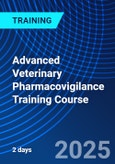The purpose of this seminar is to provide a comprehensive, yet practical, assessment of the main requirements of Volume IXB, the new key document on pharmacovigilance guidelines used by the veterinary regulatory authorities to ensure a compliant reporting company. The programme will also consider the potential impact of Brexit on pharmacovigilance and the implications of the proposed EU Regulation (2019/6) on Veterinary Medicinal Products.
Interactive sessions throughout the two days will give delegates the opportunity to discuss key issues of current concern with our experienced trainer.
This course forms part of our selection of Animal Health training courses, designed to keep you up to date with the latest regulations surrounding veterinary medicines, animal feeds, and industry best practices.
Benefits of attending
- Explore the European regulatory framework and the implications of the proposed EU pharmacovigilance legislation
- Learn the key requirements of Volume IXB and a detailed description of the pharmacovigilance system (DDPS) and the pharmacovigilance system master file (PSMF)
- Gain PV training, PV reporting in licensing/distribution agreements and company core safety information compliance
- Understand product safety reviews, signal detection and benefit-risk assessments
- Look at risk management and crisis management
Agenda
Day 1
The DDPS and the PSMF
- The DDPS
- The DDPS - what happens now?
- The PSMF - purpose and maintenance
- Transition from DDPS to PSMF
PV training
- Requirements for PV training
- Who trains whom and when?
- Training records, maintenance and updates
- Role of QA and HR in training
Product safety reviews
- The safety review committee
- Timings for safety review
- Record keeping for safety review meetings
Company core safety information
- Core safety information
- How to determine what to include and what to exclude in a company core data sheet (CCDS)
- Maintenance and development of a CCDS
Compliance and PV
- Basic principles
- Measuring compliance
- Quality versus quantity in safety reports
Day 2
PV reporting in licensing/distribution agreements
- What types of agreements exist?
- Audits of pharmacovigilance capabilities in partners
- What agreements need to be in place for PV reporting?
- PV reporting agreements - what needs to be covered?
- Monitoring PV agreements - what happens if it goes wrong?
Signal detection/benefit-risk and risk management
- The pharmacovigilance system
- Signal detection and analysis: what is required?
- Benefit-risk assessments
- Risk management/minimisation
- Crisis management
- Communication with the public
Audits and inspections: are you ready?
- What are inspectors looking for?
- Inspection findings and outcomes
- Implications of the proposed EU pharmacovigilance legislation
Risk Management Dealing with an Alert
Speakers

Mr Declan O'Rourke,
Director ,
Ortec PV Consultancy IrelandDeclan O’Rourke has over 20 years’ experience in industry where he has held technical, marketing, product development, clinical development, production and pharmacovigilance roles.
He is a veterinary surgeon, holds a Diploma in Marketing, a Master of Business Administration and a Fellowship of the Royal College of Veterinary Surgeons. He now directs Ortec PV Consultancy Ireland specialising in pharmacovigilance and represented IFAH-EU in the VICH Working Group on pharmacovigilance.
He is Honorary Associate Professor in Veterinary Pharmaceutical Development at Nottingham Veterinary School and Past President of British Cattle Veterinary Association.
Who Should Attend
This seminar will be beneficial to those who have some experience of veterinary pharmacovigilance and is a good follow-on course from the Introduction to Veterinary Pharmacovigilance. Adverse event monitoring and drug safety officers, including QPPVs and deputy QPPVs, together with personnel from regulatory affairs and registration departments, will find this event useful.
The course can be used as part of the training to become a QPPV or deputy QPPV









